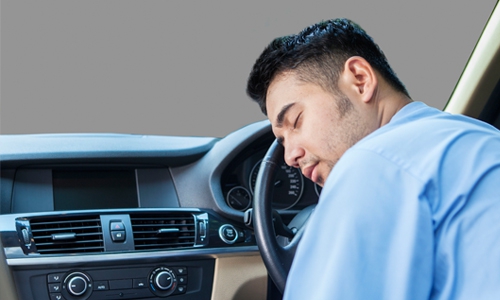
หลายคนมักมองข้ามภาวะหลับใน เพราะคิดว่าสามารถควบคุมความง่วงที่เกิดขึ้นขณะขับรถ ช่วงเวลารถติด และขับรถทางไกลนานๆ ด้วยวิธีการต่างๆ ได้ ทั้งที่ความจริงแล้วความง่วงสามารถจู่โจมแบบกระทันหัน (Sleep Attack) ทำให้หลับค้างกลางอากาศหรือเกิดภาวะหลับในได้ เพราะฉะนั้นการดูแลเรื่องการนอนหลับพักผ่อนให้มีคุณภาพ คือสิ่งสำคัญที่ช่วยให้ห่างไกลความเสี่ยงและอันตรายที่อาจรุนแรงถึงชีวิตจากภาวะหลับในได้
ภาวะหลับในคืออะไร
ภาวะหลับในหรือการหลับระยะสั้นๆ (Microsleep) เป็นปรากฏการณ์การสับสนระหว่างการหลับและการตื่น โดยการหลับเข้ามาแทรกการตื่นอย่างเฉียบพลันโดยไม่รู้ตัวในช่วงเวลาสั้นๆ ประมาณ 1-2 วินาที
สาเหตุของภาวะหลับใน
มีหลายสาเหตุที่ทำให้เกิดภาวะหลับใน ได้แก่
- อดนอน การนอนน้อยหรือนอนไม่พอต่ำกว่า 7 ชั่วโมงต่อวัน เพิ่มความเสี่ยงในการเกิดภาวะหลับใน เพราะสมองส่วนธาลามัสอาจหยุดทำงานสั้นๆ ชั่วคราว ส่งผลให้เกิดความง่วงกระทันหัน (Sleep Attack) งีบหลับไม่รู้ตัว ไม่ตอบสนองต่อการรับรู้จนเกิดภาวะหลับในได้ นอกจากนี้ยังทำให้น้ำหนักเพิ่ม เกิดภาวะซึมเศร้า หลอดเลือดสมองตีบ เรียนรู้สิ่งต่างๆ ช้าลง หากอดนอนเรื้อรังในระยะยาว
- นอนไม่เป็นเวลา นอนดึกตื่นสาย ส่งผลเสียต่อร่างกาย คือ ฮอร์โมนเกิดการเปลี่ยนแปลง รู้สึกอ่อนเพลียนอนไม่เต็มอิ่ม เช่น เข้านอนตี 4 ตื่นนอนเที่ยงวัน คุณภาพการนอนไม่ดีเท่ากับเข้านอน 4 ทุ่ม ตื่นนอน 6 โมงเช้า เป็นต้น
- เวลาเข้านอนเปลี่ยนไปเปลี่ยนมา ส่งผลให้สมองงงและเกิดความเสื่อม เพราะปกติสมองจะจำเวลานอนและเกิดความง่วงในเวลานั้น ถ้าเปลี่ยนเวลาเข้านอนบ่อยๆ จะทำให้เวลานอนไม่ง่วง นอนน้อยลง หลับไม่เต็มอิ่ม เช่น ช่วงวันหยุดเสาร์อาทิตย์เข้านอนดึกมากหลังตี 2 ตื่น 9 โมงเช้า ส่วนวันธรรมดาเข้านอน 4 ทุ่ม ตื่นนอนตี 5 เป็นต้น
- กรรมพันธุ์ ส่งผลให้บางคนอยู่ในกลุ่มนอนยาว (Long Sleepers) มีความต้องการนอนนานถึง 10 ชั่วโมงจึงจะสดชื่น หรือบางคนอยู่ในกลุ่มนอนระยะสั้น (Short Sleepers) เพียง 4-5 ชั่วโมงก็ตื่นมาได้อย่างสดชื่น แต่พบได้ในจำนวนน้อยมาก ดังนั้นหากไม่มั่นใจควรปรึกษาแพทย์ผู้เชี่ยวชาญทางด้านการนอน
สัญญาณเตือนง่วงมากผิดปกติ
หากเกิดสัญญาณเตือนดังต่อไปนี้ อาจบ่งบอกว่าคุณเสี่ยงหลับใน
- ตื่นตอนเช้าไม่สดชื่นอยากนอนต่อ
- ง่วงเหงาหาวนอนบ่อยๆ ต่อเนื่องระหว่างวัน
- มึนศีรษะ มองภาพไม่ชัด ตาปรือ รู้สึกลืมตาไม่ขึ้น มองข้ามสัญญาณไฟจราจร
- ขาดสมาธิในการทำกิจกรรมต่างๆ โดยเฉพาะการขับขี่ที่ไม่สามารถควบคุมเส้นทางได้
- เมื่ออยู่นิ่งๆ เผลอหลับแบบไม่รู้ตัว
- อ่อนเพลีย เหนื่อยล้า กระวนกระวาย
ป้องกันให้ทันเวลา
การป้องกันภาวะหลับในไม่เพียงช่วยลดการเกิดอุบัติเหตุ แต่ยังช่วยพัฒนาคุณภาพการนอนให้ดีขึ้น ได้แก่
- นอนให้พอ ในจำนวนชั่วโมงที่เหมาะสมคือ 7-8 ชั่วโมงต่อวัน โดยเฉพาะถ้าต้องขับรถทางไกล ควรพักผ่อนให้เพียงพอติดต่อกัน 2-3 คืนขึ้นไปก่อนออกเดินทาง
- นอนเป็นเวลา ควรเข้านอนเวลาที่เหมาะสมคือ ช่วง 4 ทุ่มถึงเที่ยงคืน เพื่อให้โกรธฮอร์โมน (Growth Hormones) ที่ช่วยเรื่องการเจริญเติบโตและส่งเสริมการทำงานระบบต่างๆ ของร่างกาย ซึ่งหลั่งในช่วงตี 2 ถึงตี 4 ทำงานได้ดี เพราะฉะนั้นในช่วงใกล้ 3 ทุ่มควรฝึกตัวเองให้ผ่อนคลายและเตรียมพร้อมเข้าสู่การนอน
- นอนเวลาเดิมสม่ำเสมอ พยายามเข้านอนและตื่นนอนในเวลาเดียวกันทุกๆ วัน จะช่วยให้นอนหลับเต็มอิ่ม
- งดดื่มกาแฟหรือเครื่องดื่มที่มีส่วนผสมของคาเฟอีน อย่างเช่น ชา โกโก้ เป็นต้น ในช่วงหลัง 4 โมงเย็น เพราะจะทำให้นอนไม่หลับหรือหลับไม่ลึก ส่งผลให้ตื่นมาไม่สดชื่น
- เลือกใช้หลอดไฟสีส้ม ในห้องนอน เพราะไม่รบกวนดวงตา ช่วยให้ผ่อนคลาย หลับได้ง่ายขึ้น
- อุณหภูมิห้องนอน ควรอยู่ระหว่าง 25-26 องศาเซลเซียส ไม่ร้อนหรือเย็นจนเกินไป ช่วยให้ไม่ตื่นกลางดึกหลับสนิทต่อเนื่อง
เทคนิคขับรถไม่กลัวหลับใน
- พักคนและรถทุกๆ 2 ชั่วโมง
- งีบพักประมาณ 5-45 นาที ช่วยลดโอกาสเกิดหลับใน แต่ต้องเลือกสถานที่ที่ปลอดภัย
- หากไปหลายคนสลับกันขับเพื่อไม่ให้เหนื่อยล้าจนเกินไป
- งดดื่มเครื่องดื่มแอลกอฮอล์ เพราะเพิ่มโอกาสเกิดภาวะหลับใน
- ระวังเรื่องการทานยาที่อาจทำให้ง่วง เช่น ยาแก้แพ้ ยาแก้ปวด ยาคลายเครียด เป็นต้น
- ถ้าเลี่ยงได้ควรขับรถในช่วงกลางวันมากกว่าช่วงดึกหรือใกล้เช้า
ภาวะหลับในไม่ใช่เรื่องล้อเล่น เพราะอาจร้ายแรงถึงขั้นเสียชีวิตได้ การพักผ่อนให้เพียงพอ นอนให้เป็นเวลา และเข้านอนในเวลาที่ดีและสม่ำเสมอในทุกๆ วัน ย่อมช่วยป้องกันอุบัติเหตุที่อาจเกิดขึ้นจากภาวะหลับในได้ แต่ถ้าหากนอนเพียงพอแล้วยังรู้สึกง่วง ไม่สดชื่น ควรเข้ารับการตรวจ Sleep Test เพื่อวินิจฉัยการนอนโดยละเอียดกับทีมแพทย์ผู้เชี่ยวชาญ จะได้ดูแลการนอนให้มีคุณภาพ ช่วยให้สุขภาพแข็งแรงและเป็นการพักผ่อนชาร์จพลังให้ร่างกายอย่างแท้จริง